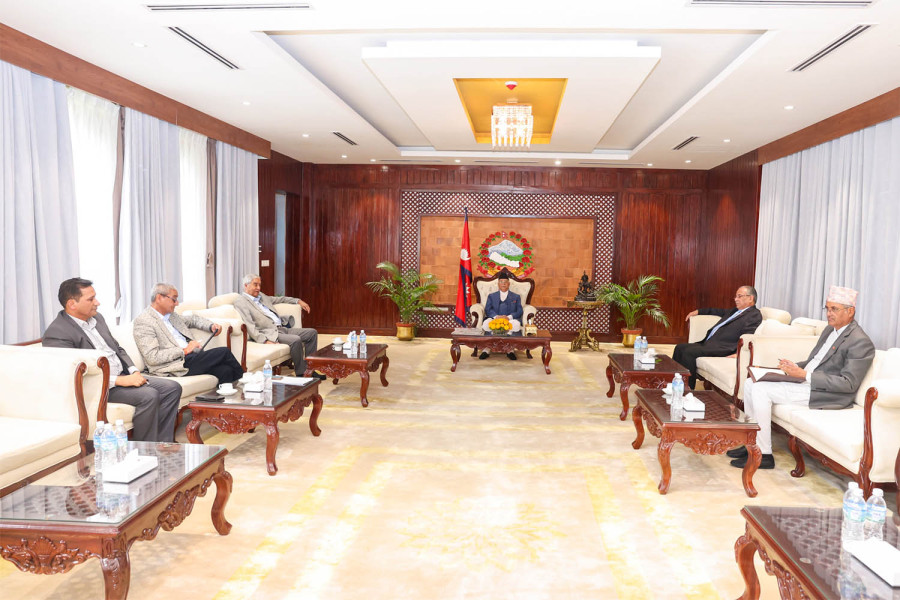National
Government to form search committee to recommend officials for two TJ commissions
The panel is expected to be finalised at Friday’s Cabinet meeting.
Post Report
Top leaders of Nepal’s three major political parties have agreed to expedite the formation of a search committee to recommend candidates for the Truth and Reconciliation Commission (TRC) and the Commission of Investigation on Enforced Disappeared Persons as soon as possible. During a meeting held at the Prime Minister’s residence in Baluwatar, Kathmandu on Thursday, the leaders decided to fast-track the remaining tasks of the peace process.
Leaders from the CPN-UML, Nepali Congress and Maoist Centre agreed to form the search committee responsible for selecting officials for the commissions, said Shakti Basnet, a leader from the Maoist Centre. The committee is expected to be finalised at the next Cabinet meeting, scheduled for Friday.
“The Cabinet will decide the members of the search committee in its upcoming meeting, accelerating the formation of both the TRC and the Commission of Investigation on Enforced Disappeared Persons,” a source from Baluwatar stated.
Earlier in April, the government had formed a five-member committee led by Om Prakash Mishra, a former Chief Justice, to nominate the candidates for both the commissions but it could not do so after the National Human Rights Commission refused to send its representative in the search committee saying that it needs a time-bound commitment from the government to endorse a bill to amend the Enforced Disappearance Enquiry, Truth and Reconciliation Commission Act.
Other members of the search committee led by Mishra were former Supreme Court judge Jagadish Sharma Poudel, former ambassador Arjun Karki and human rights activist Stella Tamang and representative of the national human rights commission.
“We will recommend the qualified people in the commission so that both the commissions could carry forward the spirit of the peace process, legal procedure and can reach out to all stakeholders and suggest and resolve the issues,” Basnet said. “The search committee will recommend the names for both commissions.”
Sources said that former chief justice Mishra will lead the search committee this time as well but the remaining four members besides representation from the National Human Rights Commission will be changed. The search committee was formed as per the Supreme Court’s March 12 order to the government to select office bearers for the two commissions within a month.
The court had asked the government to constitute task forces within the commissions to conduct preliminary investigations into the victims’ complaints until the office bearers were appointed.
According to the two newly revised Acts related to the truth and reconciliation process, the recommendation committee shall be given two months to make nominations for the chairpersons and members of the two commissions.
Prime Minister and CPN-UML Chairman KP Sharma Oli, Nepali Congress President Sher Bahadur Deuba and Maoist Centre Chairman Pushpa Kamal Dahal were present at Thursday’s meeting. Other leaders in attendance included Home Minister Ramesh Lekhak, Maoist Centre leader Basnet and Attorney General Ramesh Badal.
Basnet added that the meeting agreed to finalise the search committee, which had been initiated during the tenure of his party’s chair Dahal as prime minister.
“The meeting to expedite the remaining tasks of the peace process follows the decision made during Maoist Centre chair Dahal’s premiership,” Basnet said. “The parties had agreed to form a search committee to select candidates for the Truth and Reconciliation Commission and the Commission of Investigation on Enforced Disappeared Persons.”
Earlier too, the government had formed two commissions to look into the case of truth and reconciliation process and inquiry into disappearances but they failed to achieve the goal. The Truth Commission has received 63,718 complaints, while the commission on disappearances is sitting on around 2,400 cases. The new teams will have four years to accomplish their tasks, though there are provisions for their extension. The commissions that were formed in 2015 have done nothing other than collect complaints and conduct preliminary investigations on some of them.
Previously, the government passed a bill related to transitional justice, which was ratified by the President on August 29. The House of Representatives passed the bill on August 14, followed by its approval by the National Assembly on August 22. The two commissions have been paralysed since July 2022 after the government decided to extend their terms without retaining their chairmen and members.




 18.12°C Kathmandu
18.12°C Kathmandu













